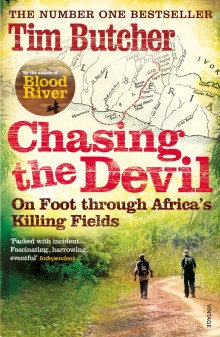
For many years Sierra Leone and Liberia were too dangerous for outsiders to travel through, bedevilled by a uniquely brutal form of violence from which sprang many of Africa’s cruellest contemporary icons – child soldiers, prisoner mutilation, blood diamonds. With their wars over, Tim Butcher set out in 2009 on a journey across both countries, trekking for 350 miles through remote rainforest and malarial swamps. Just as he followed H M Stanley through the Congo – a journey described in his bestseller Blood River – this time he pursues a trail blazed in 1935 by Graham Greene and immortalised in the travel classic Journey Without Maps. Greene took 26 bearers, a case of scotch, and hammocks in which he and his travelling companion, his cousin Barbara, could be carried. Tim walks every blistering inch to gain an extraordinary ground-level view of a troubled and overlooked region.
As a journalist in Africa, Tim came to know both countries well although warfare made trips to the jungle hinterland far too risky. This is where he now heads, facing down demons from his time as a reporter, exploring how rebel groups thrived there for so long and seeing whether the devil of war has truly been chased away. And he encounters other ‘devils’, masked figures guarding the spiritual secrets of jungle communities. Some are no more threatening than schoolmasters but others are much more sinister, relying on ritual cannibalism as a source of magical power. Tim encounters these devils, both good and bad, on an epic journey demanding courage, doggedness and good fortune.
Chasing the Devil is a dramatic travel book touching on one of the most fraught parts of the globe at a unique moment in its history. Weaving history and anthropology with personal narrative – as well as new discoveries about Greene – it is as exciting as it is enlightening.
The Independent
“Butcher’s book is packed with incident …. a fascinating, harrowing and eventful book.’’
Archbishop Desmond Tutu
“Chasing the Devil shows the power of good to prevail over evil. Where once there was cruelty and conflict in Sierra Leone and Liberia, Tim Butcher finds grounds for hope, giving a voice to the silent majority who retained their dignity in the face of terrible suffering. It is an inspirational account of humanity’s wonderful spirit to survive and proof that, in Tim Butcher, Africa has a worthy chronicler.’’
Dervla Murphy
“My favourite sort of travel book – a real self-propelled journey plus engaging personal reflections and vivid historical vignettes linked to the grimness of contemporary events. Another masterpiece from a writer of enviable skill.’’
The Guardian
“A multi-layered and thought-provoking account of the attractions of danger and his encounters with the devastation of ritual violence, child soldiers, blood diamonds and the “devil” guarding remote jungle communities.’’
Andrew Roberts
“With an eye for illuminating detail and a nose for the stench of corruption and vice equal to Graham Greene’s, Tim Butcher leads the reader through the physical and moral jungles of two of Africa’s most vicious yet also hauntingly beautiful failed states. Part explorer-adventurer, part war correspondent, part literary sleuth, Butcher has embarked on a remarkable writing career.’’
Paul Theroux
“This adventurous book, in the footsteps of Graham Greene, in many ways goes deeper than Greene, and shows the enduring beauty and danger in Sierra Leone and Liberia.’’
Financial Times
“Butcher’s travelogue is a mix of nervous adventuring through a landscape littered with shell casings, and historical assessment peppered with Greeniana. Sobering and illuminating.’’
Wilbur Smith
“Intrepid traveller, Tim Butcher, dares to venture into Africa’s dark heart where he records, with perceptive eye and polished pen, the other world he finds there. If Africa interests you, then this book will fascinate you.’’
Anthony Bourdain
“Amazing. As history, as anthropology, as a ripping yarn. Both exploration of an epic journey–and a hard yet sympathetic look at a Utopia-gone wrong.’’







































































